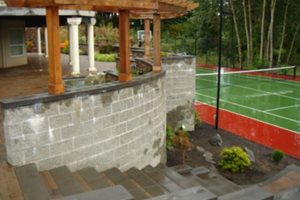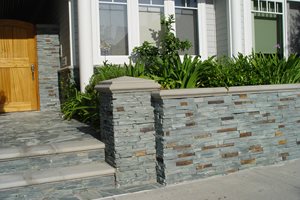Retaining Wall Materials Comparison Chart
Compare block, veneer, concrete, brick, wood, boulders and gabion wallsWhen it comes to residential retaining walls, there are a variety of materials to choose from. You'll need to consider the purpose of the wall, the look your desire and your budget when deciding what retaining wall material is best for you. Whether you choose concrete block, stone, or another material, you'll want to understand the basics of retaining wall construction so that you can make sure your wall is designed and built correctly.
| TYPE OF MATERIAL | PROS | CONS | STYLE | DURABILITY |
|---|---|---|---|---|
Concrete Block
|
Can be used to create curves |
Can only be used for walls under 4-foot tall |
|
Lack of footings may affect strength |
Stone Veneer
|
|
Must be well designed, usually requiring a landscape architect or capable contractor |
Natural stone varies by color and style but it's important to match the stone on existing architecture |
Solid core can be designed in almost any thickness and height |
Poured Concrete
|
|
|
The smooth, sleek form is often used in modern landscapes |
Forms have to be immaculate to reduce chances of a wave or a bulge |
Brick |
Strong and durable |
|
Complements traditional homes and landscapes |
Installation methods result in a solid structure which is extremely durable |
Wood |
|
|
|
If installed with proper materials, waterproofing and preservatives, it can last for 20 years or more |
Dry Stone/Boulder
|
The most natural solution to grade change |
Difficult to control water flow |
Dry boulder and stone walls are ideal for colonial, country, and English-style gardens |
Water accumulating in the interior of the wall will destroy its integrity |
Gabion |
|
Wire basket may rust away in certain conditions |
Complements coastal and riverside homes |
Unlike most building materials, a gabion wall can move with the earth and be placed along waterfront areas |
Tips for picking the best retaining wall material:
- Coordinate with the materials already used on the outside of your home
- Pick an option that will hold up well in your climate
- Compare the cost per square foot and make sure your choice fits within your budget
- Pick an easy to install material if you plan to build the wall yourself

 Backyards
Backyards
 Front Yards
Front Yards





